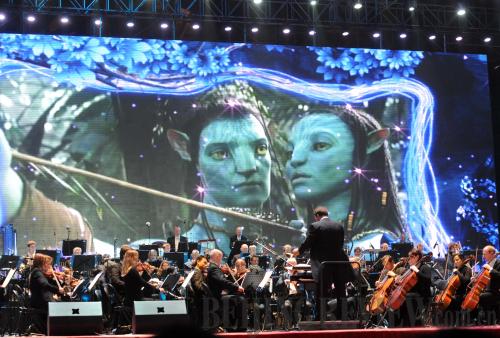|
 |
|
FILM MUSIC: The British Royal Philharmonic Orchestra performs popular movie theme songs at the closing ceremony of the Beijing film festival on April 28. Scenes from Avatar light up the background (CHEN CANGKE) |
The Second Beijing International Film Festival (BJIFF) was held on April 23-29, attracting more than 4,000 filmmakers and movie stars both domestic and foreign. A series of meetings led to new agreements on movie cooperation and trade.
Unlike the Academy Awards in the United States or the Cannes Film Festival in France, which award the year's top films, BJIFF aims to develop the Chinese film industry by promoting collaboration with partner film studios abroad.
Despite its short history, the festival is already one of the largest platforms in China for movie stars, producers and studios to cooperate and advance the increasingly robust Chinese film industry.
The number of movie theater screens in China doubled over the past five years to 10,700. Total box-office revenue topped $2 billion for the first time in 2011, beating Japan to become the largest foreign market for American films.
Filmmakers are hoping to make Chinese movies a hit internationally.
"China needs a platform like the film festival to increase the influence of its films and spread its culture," said Li Qiankuan, a well-known film director and Chairman of China Film Association.
For this purpose, the Second BJIFF held three main forums, including the Summit Forum of World-Renowned Film Companies, Sino-Foreign Film Co-Production Forum, and Film Music Forum, where filmmakers forged new partnerships. Dozens of senior film studio executives across the country attended the forums, representing China Film Group Corp., Huayi Brothers Media Corp., Fox Films Entertainment, Marvel Entertainment and others.
The week-long convention generated over 5.2 billion yuan ($837 million) in contracts signed for 21 film projects, an increase of 88.7 percent over the previous year.
Li Chunliang, Director General of the Beijing Municipal Bureau of Radio, Film and Television, and Vice Chairman of the BJIFF Organizing Committee, noted three achievements of the film festival.
"First, both Chinese and international film enterprises have a stronger impetus to cooperate with each other," said Li. "Second, film cooperation becomes more detailed, diversified and broad." Such alliances fuel the movie business and bring in funding for bigger projects.
"Third, big projects which cost over 100 million yuan ($15.9 million) account for 61 percent of the total projects, reflecting the confidence of foreign investors in the Chinese film market."
"While there is still much work to do to promote the festival's influence and Chinese films in the global market, the BJIFF is an ideal platform for cooperation and exchange of film industries," Li said.
In addition to the flurry of deal making, Beijing's film festival got a boost in publicity from an appearance by world-famous Hollywood director James Cameron. In 2009, he ushered in a new era of 3D and IMAX-3D with his blockbuster sci-fi epic Avatar.
The 3D re-release of Titanic was the biggest opener of all time in the country, earning $58 million in the first six days of its show in April. The director attended a series of BJIFF events to seek partners in developing the 3D technology that he believes is the future of the cinema.
On April 27, Cameron and 3D photography expert Vince Pace's company announced that they would open a China headquarters in Tianjin, along with representatives from Tianjin Binhai New District and Tianjin North Film Group.
| 